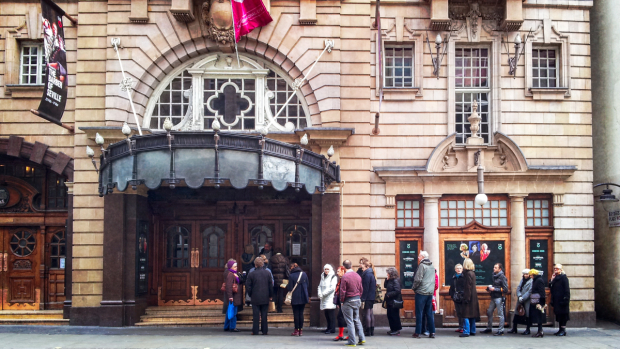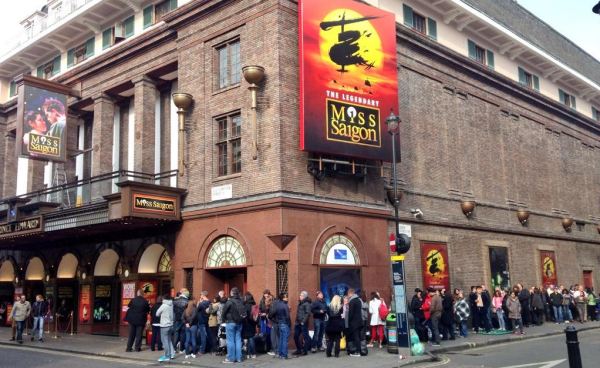If you want to see London's best theatre, join the queue for day seats

Suppose, last week, you saw rave after rave of The Ferryman and you decided to book. Look online, and you’ll find the Royal Court run entirely sold-out. It’s been that way for ages. Jez Butterworth’s new play broke box office records: the fastest-selling show in the theatre’s history. There’s still availability for the West End run, but not much. Most performances have only a couple of cheap seats available. Leave it too long – maybe a fortnight – and you’ll have to pay £59.50.
London theatre is booming, undoubtedly, and show after show is selling out well in advance. Already this year, Angels in America, Andrew Scott’s Hamlet and Billie Piper’s return to Yerma were all fully booked long before rehearsals began. Lucy Kirkwood’s new one, Mosquitoes, sold out within hours of the National releasing new tickets. And all that’s before we even start talking about Hamilton and Harry Potter.
When we talk about accessibility, we tend to talk about cheap tickets. They’re imperative. To be accessible, of course theatre has to be affordable. But it also has to be available.
Young audiences tend to book late, but too often, late is too late
As theatre memberships have increased, the perks being priority booking, so fewer tickets make it to general sale. With big productions (especially in small houses), those tend to sell out at speed. As London’s population increases, so too does competition for tickets. Its theatres stay the same size after all. We know young audiences tend to book late, but too often, late is too late.
As a result, ticket buying has become more and more frenzied: a round-robin of new season releases, long online queues and, increasingly, advance lotteries. To get into theatre, you have to be in the know. For all the talk about accessibility, that’s a big obstacle.
There has, in recent years, been a push to preserve last minute tickets. The Donmar Warehouse led the way with its Front Row scheme, releasing seats every Monday two weeks in advance. Others have followed: the National and the Royal Opera House with their Friday Rush tickets, the Royal Court with its £12 Monday seats available on the day itself. Again though, with a rush, these end up like lotteries. You need some luck.
Here’s a tip then: day seats. Every day, most theatres will put a handful of tickets on sale, in person, at the box office. For the time-rich and cash-poor, not to mention the disorganised but determined, they’re a godsend: cheap tickets for those willing to got the extra mile.
Standing on a cold Covent Garden pavement for a few hours only ups the intensity of the entire experience
For big hits, that generally means queuing up well in advance – not just 10 minutes beforehand, but as early as 5.30am. It turns a theatre trip into an all day affair. That, in itself, can be hugely rewarding – far more so than just splashing the cash. To dedicate a day to seeing a show, to haul yourself out of bed and across town, to stand on a cold Covent Garden pavement for a few empty hours, all for the sake of a show, only ups the intensity of the entire experience. It’s not just that you feel lucky to see a sell-out hit, it’s that you’ve earned the privilege. You’ve chosen to be present and then put the effort in.
I speak from experience. Some of my most precious theatre memories came via day seats. I sacked off school, aged 17, to see Sam Mendes’ final two shows at the Donmar Warehouse: Twelfth Night and Uncle Vanya with a top-drawer ensemble (Simon Russell Beale, Helen McCrory, Emily Watson, Mark Strong). I made it my mission to get to Rupert Goold’s Macbeth, missing out once, then going back even earlier, and I snaffled the last ticket to Jerry Springer the Opera on its final performance at the National Theatre. All were impulsive decisions and, without day seats, none would have been possible.
Day seats have long been a trade secret – and a vital one at that. It’s imperative that aspiring artists (and, ahem, critics) get to see theatre of the highest quality. Those are the shows that provide inspiration and reference points. They shape the conversation long-term. They’re also the shows that tend to shut people out.
That there’s a demand for theatre in London is fantastic, but theatres have to guard accessibility and that means promoting all available options as far and wide as possible, day seats and all. Expense isn’t the only route to exclusivity.
Click here to read our guide on how to get day seats











